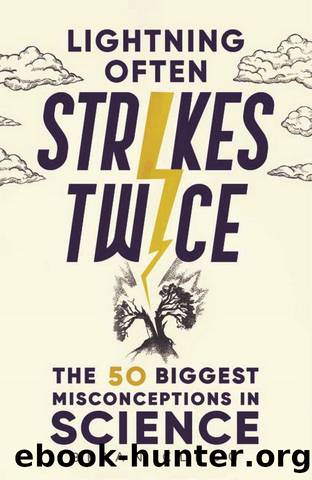Lightning Often Strikes Twice: The 50 Biggest Misconceptions in Science by Brian Clegg

Author:Brian Clegg [Clegg, Brian]
Language: eng
Format: epub
ISBN: 9781789294255
Google: 2puvzgEACAAJ
Publisher: MikeO'Mara
Published: 2022-07-21T20:38:30+00:00
___________
6. Note: the plural of octopus is not octopi â it is not a conventional Latin word that would have such a plural. As the Edwardian English usage guide Henry Fowler said, octopodes (the strictly accurate plural) is pedantic, while octopi is plain wrong. Stick to octopuses.
âOrganicâ is one of those words that we have loaded with more meaning than it can accurately carry. We tend to think of organic food as being healthy and fresh and good. We have to be a little careful when scientific terms are taken over by marketing people, as is the case here. All food is organic, the term properly referring to chemical compounds based on carbon. But in food, the label is applied to foodstuffs that have been produced in a particular way. Being organic in this sense can have impacts on the environment in which the food is produced (good and bad) â but it says little about the healthiness of the food itself.
A number of years ago, I interviewed Helen Browning, then head of the Soil Association, the UKâs main organic body. Sheâs a pig farmer and she said to me that the only health claim she made for her organic bacon was that it is better for you than a bag of doughnuts. The fact is, as she was happy to accept, there is very little nutritional difference between organic food and inorganic food.
What, then, is the difference between organic and non-organic food? A cynic would say âthe priceâ â and it is certainly true that retailers use the organic label to test for price insensitivity in their shoppers. But there are some real differences. Animal welfare tends to be better on organic farms than factory-style farms â though there is no difference between, say, the welfare of organic-reared animals and other free-range animals. There can also be health disbenefits for the animals in the organic regime as organic bodies tend to be supportive of unscientific alternative medical approaches such as homeopathy.
Another big difference is that organic standards restrict fertilizers and pesticides to natural chemicals and products. This can be beneficial for the land, although it has also resulted in dangerous chemicals such as copper sulphate, which was traditionally used as a fungicide, being retained where they would otherwise be banned. But when it comes to health, there is one pesticide-related claim that organic supporters have sometimes made stridently.
In 2001 a representative of the Soil Association wrote in the Guardian newspaper: âYou can switch to organic or you could accept that every third mouthful you eat contains poison. Are you up for that?â The suggestion was â and this still regularly comes up â that organic food is better for your health because it retains fewer pesticide residues. However, this is a misrepresentation. In reality, pretty well every mouthful you eat contains poisons. This is because plants are in a constant battle with insects and animals that damage them. As a result, they almost all produce natural insecticides and poisons. Which we then consume.
Download
This site does not store any files on its server. We only index and link to content provided by other sites. Please contact the content providers to delete copyright contents if any and email us, we'll remove relevant links or contents immediately.
Uncle John's Impossible Questions (& Astounding Answers) by Bathroom Readers' Institute(371)
Uncle John's Curiously Compelling Bathroom Reader by Bathroom Readers' Institute(369)
Uncle John's Factastic Bathroom Reader by Bathroom Readers' Institute(360)
50 Things Youâre Not Supposed to Know by Russ Kick(213)
Uncle John's Facts to Go Call of the Wild (Uncle John's Facts to Go Series Book 14) by Bathroom Readers’ Press(205)
Uncle John's Facts to Go History Makers (Uncle John's Facts to Go Series Book 1) by Bathroom Readers' Institute(202)
Lightning Often Strikes Twice: The 50 Biggest Misconceptions in Science by Brian Clegg(193)
101 Facts You Didn't Know about Space by Thompson Mark;(191)
Uncle John's Facts to Go UJTV by Bathroom Readers' Institute(185)
The World's Worst by Mark Frauenfelder(179)
The Ultimate Book of Top Ten Lists by Jami Frater(175)
1000 Things You Might Not Have Known About Famous People by Brown John(175)
Kiamichi Bigfoot: Investigating the Oklahoma Sasquatch by Wilbanks David(174)
Beyond Bizarre: Frightening Facts & Bloodcurdling True Tales by Varla Ventura(173)
Astronomy in Minutes by Giles Sparrow(173)
Adventures in Cryptozoology: Volume 1: Hunting for Yetis, Mongolian Deathworms, and Other Not-So-Mythical Monsters by Richard Freeman(171)
The Essential Book of Useless Information by Don Voorhees(164)
101 Amazing Facts about The Orchestra by Jack Goldstein(163)
Hey, Idiot! by Leland Gregory(158)
